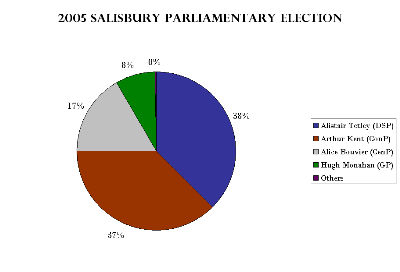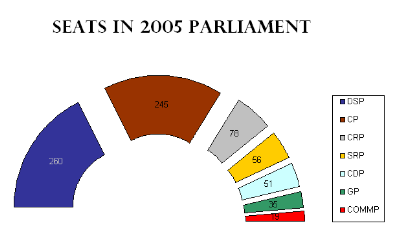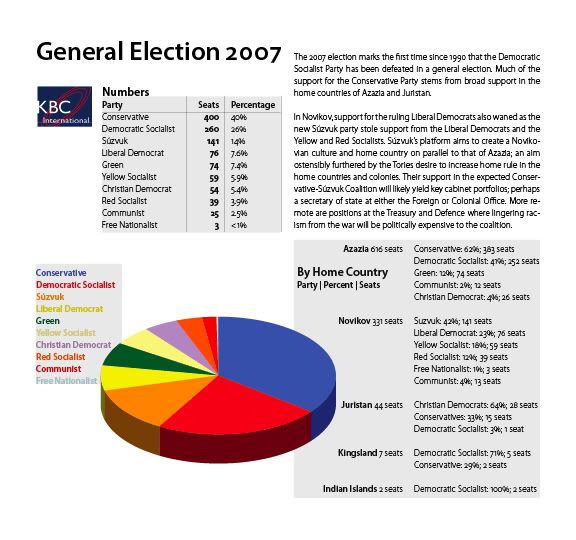Alistair Tetley
 This article has been nominated as a featured article candidate.
This article has been nominated as a featured article candidate.
Please comment on this article's talk page to second or contest the nomination, or share your comments.

| |
|---|---|
| Rank | 18th Prime Minister of the Azazian Commonwealth 1st and 3rd Prime Minister of the United Kingdom |
| Term of Office: | 2nd February 1997 to 21st January 2006 28th January 2006 to January 2007 |
| Predecessor: | Reginald Baker Daniel Collins |
| Successor: | Daniel Collins Rodney Ingrahm |
| Birthdate | 10th January 1963 |
| Place of Birth: | Salisbury, West Oceania, Azazia |
| Spouse | Single |
| Profession | Politician, economist, banker, historian |
| Political party | Democratic Socialist Party (DSP) |
| Languages spoken | English |
| Degrees |
|
The Most Honourable Alistair Winston Tetley, Marquess of Salisbury, M.A.(Econ.), M.A.(Hist.) is an Azazian politician; leader of the Democratic Socialist Party from 1997 until his brief forced internal exile in the early part of 2006. At just shy of a decade of rule, Tetley is the longest serving Prime Minister of the United Kingdom in Azazian history (though former Prime Minister Neville Alexander accumulated more years in two separate terms.) Throughout these years, however, his programmes and policies have done much to galvanise both his supporters and detractors thereby making him one of the UK’s most divisive figures.
Contents
As a Citizen
Early Years
Born on January 10, 1963 in the small town of Salisbury, situated in the mountains to the east of then St. Brendans, he was brought into this world and raised by his two parents Charles and Sarah Tetley. Charles worked in St. Brendans as a professor of history while Sarah performed the role of a housewife and took great care to raise the couple’s only child.
Enrolled at St. Francis Elementary, young Alistair Tetley devoted his time to his studies as in later years he would recall children picking on him “incessantly,”[1] and “I continued to read books instead of making friends.”[2] It was also at St. Francis, where priests and nuns were known to hit children with rulers and other harsh abuse, that the future Prime Minister claims he turned against religion. “I never saw the point in religion after that, to be honest… When reading about science and history there are numerous great men and women who became something without having to subvert their beliefs to those of their religion. That, and I distinctly remember that those metal rulers stung a good bit.”[3]
Receiving only average grades, his parents then sent him to St. Martin’s School for Boys, a private school outside St. Brendans where his religious parents hoped he would find God and be forced to work harder. Instead, however, he found himself at odds with the devoutly Catholic school administration and spent much of his out of school time organizing school-wide protests. Tetley calls this his first entrance into politics as had previously thought politics as something “the old folks did at night over dinner.”[4]
His schoolwork, however, did improve and won him a scholarship to one of the nation’s most prestigious universities, Hillcrest, where he double majored in Economics and History, specalising in Ancient History. It was at Hillcrest where Tetley first met the soon-to-be King Michael I, and the two struck up a friendship through their similar fates as outcasts among the larger school body. While the Prince was crippled by a debilitating disease, Tetley remained short and quiet, preferring to soak up information rather than adding it to class discussions. Nevertheless, he graduated with high honours and soon found himself running for a local election to the township council in Salisbury, his hometown.
Winning the seat through the reputation of his father, the younger Tetley came into his own as a quiet-voiced but quite literate orator who managed to turn around the once deficit ridden township through the cutting of spending all the while maintaining public services, a presage to his future political career.
Personal Life
Since becoming the Marquess of Salisbury, little has changed with regards to the Prime Minister’s personal interests. Although afforded little time, Lord Salisbury has always been fond of sailing and maintains a small cutter for private use and a larger schooner for hosting social events – though it was used more regularly before Lord Salisbury’s political career took off.
Salisbury formerly ran cross country, and his estate includes pristine woods and forests into which he has cut a small path that many say he runs regularly when at home during recesses. While in Imperium at the Citadel, he is known to run laps around the interior wall of the fortress.
Although fully dedicated to his career as a politician and head of government, Lord Salisbury has made known to the public - both knowingly and inadvertently – that he keeps many friends in both the business and political worlds. Perhaps most significant in terms of his tenure as Prime Minister is the relatively young, but, according to Lord Salisbury himself, quite close friendship with former Pacitalian Prime Minister Dr. Timothy Ell.
As Prime Minister, Lord Salisbury reportedly finds himself the frequent butt of his staffers’ jokes, specifically with regards to his lack of success with women. While not of national importance, Lord Salisbury was the first Prime Minister to serve as a bachelor (Daniel Collins served as a bachelor as well, but he served for but a week before Lord Salisbury resumed the premiership.)
As a Politician
Setting of the National Stage
By the age of 25, Alistair Tetley gained the attention of Reginald Baker, the leader of the Democratic Socialist Party in Parliament through Salisbury’s own MP, a DSP faithful readying to retire. By now, having left the township council to focus on his career as an investment banker and through the death of his parents in an automobile accident, Tetley had acquired a considerable sum of money that allowed him to buy a mountain-top resort home that he converted into a full-time house away from the urban blight of St. Brendans, now finally being identified as Breningrad by its residents. In a private meeting at his home in Salisbury, Tetley met with Reginald Baker and left the meeting with a promise of DSP support if he agreed to run to replace Chester Worthington. The by-elections that year proved successful and the well-known and well-respected quiet boy from Salisbury headed across the New Britain Strait to Parliament House.
On the Backbench
Between 1988 and 1990, Tetley served on the backbenches of the House of Commons in support of his party, then in opposition to Conservative Violet Clarke, then Prime Minister to President Robert Mudd. Tetley arose on several occasions and with his quiet voice managed to silence the usually raucous House where they sat amazed by his courage to go directly after Clarke and Mudd’s policies. However, by 1990, the string of good economic luck for the Conservatives collapsed and a minor recession triggered by a run on oil brought the DSP into power.
In 1991, Robert Mudd collapsed at a speech in Artega, and for the following three weeks as the President recovered, Reginald Baker ran the nation as Prime Minister through the institutions provided by Parliament. Tetley later wrote that this experience “was the first time I saw that the office of the president was truly superfluous in the Commonwealth. Between the president and the monarch there were two heads of state who seemed to do nothing.”[5] After the return of Mudd in the new year of 1992 elections were held and with the economy righting itself, the last Conservative president was voted out of office and in came Edward Breckins.
Cabinet Ministries
Following the 1992 elections, Tetley was brought into Baker’s Cabinet as the Minister of Transportation. In this position, he advocated bills that broke up the national rail company and privatized government-held stock. The same bill also held for deregulation of rail systems allowing private companies to invest in new technologies that were more efficient, although still highly experimental. He also pushed Parliament to increase government spending for mass-transit systems over the increasingly congested automobile routes, arguing that more capable and more rapid mass transit systems would draw people away from the roads and thus ease the strain on the highways while cutting pollution.
In 1994, Baker moved Tetley to the Ministry of Trade and Industry where the future Prime Minister oversaw the few trade agreements with foreign powers. The first signs of friction between the two men became evident as Tetley argued for greater international contact to bring in new capital and new ideas while Baker continued to play to the near xenophobic base of the DSP party. Elections were called in 1995, and without much to show in his new portfolio except an attempt to push the Commonwealth into the world stage, Tetley barely retained his seat with a mere 44% of the vote.
Nevertheless, Baker recognised the great need for a youth and vitality in the party and so after much deliberation named his Cabinet with the 32 year old as Chancellor of the Exchequer, the second most important cabinet position within the Cabinet. As Chancellor, Tetley pushed for the separation of the Bank of the Commonwealth, the central bank of the then Commonwealth, which he received in a vote in late 1996. This, however, would be his last major act as Chancellor of the Exchequer as just seven weeks later, in January of 1997, Reginald Baker died of a heart attack at his home in Newport over the Christmas Recess.
Prime Minister of the Commonwealth
A week after Reginald Baker’s death, the Democratic Socialist Party held a vote to designate the new Prime Minister, by an overwhelming 73% of the vote the name Alistair Tetley was inscribed in Parliament House as the 18th Prime Minister of the Commonwealth. Immediately after securing his position, he named a new cabinet that included enough of Baker’s allies to keep the party happy while new blood was pumped into the Ministries of Foreign Affairs, Defence, and the Interior. Tetley would later recall that it was during this time period when he first conceived the notion of abolishing the loosely governed Commonwealth and replacing it with a stronger unitary government.
Economic Initiatives
For the remaining three years of his first term as Prime Minister, Alistair Tetley moved very little in the direction of opening the Commonwealth to the international community and instead he focused on revitalizing the Azazian economy through privatization of the major transport, industrial, and defence industries – a move that would see by 1999 a staggering growth rate of 9.4% for the Commonwealth’s economy, although it fell short of Tetley’s goal of 10%.
Additionally, Tetley moved to enact strict regulations on primary sector industries including fisheries, mining, and logging. These measures were passed in early 1999 as part of an attempt by Prime Minister Tetley to secure the long-term viability of the industries, which as he stated in a near hour-long speech in the House of Commons, could protect hundreds of thousands of workers in the coming years at the cost of a few thousand in the present. And a few thousand it did cost as the new regulations significantly cut down the amount of fish allowed to be caught as well as trees to be felled and the number of mines in operation as many were forced to close from bankruptcy resulting in heavy fines from gross pollution of the environment.
Abolition of the Office of the President
In 2000, Tetley met with President Breckins privately in the Azazian Sea on a sailboat owned by Tetley since his early twenties. According to Tetley it was during this meeting that Breckins agreed to the fundamental changes Tetley sought to install in the Commonwealth; and first among them was the removal of the Office of the President. Now at the end of his second four-year term, the maximum allowed by law, Breckins agreed to advocate amongst DSP MPs for a bill that Tetley would present called the Parliament Act of 2000. The Act stripped the powers of the president with regards to hosting foreign dignitaries and representing the state and most critically approving legislation and appropriated those powers to the monarch. To the Office of the Prime Minister, Tetley shifted the powers concerned more with legislation, specifically the ability to request that the Sovereign dissolve Parliament, call it into session, and for the Prime Minister himself to call for elections. It is important to note, however, that the dissolution of Pariament and such were but recommendations that still required Royal Assent.
Shortly before the general elections of 2000 the Parliament Act was passed and at the end of his term, Edward Breckins stepped down only to die from an inoperable brain cancer seven months later.
Prime Minister of the United Kingdom
Having been reelected successfully in the elections, Prime Minister Tetley organised a new Cabinet and began to push for the reforms that would culminate in the Empire Act of 2002. In a speech given on a rainy day at Parliament, Tetley called for the construction of a new liberal empire that would guarantee the security of the Pacific for the benefit of economic prosperity and the peace that would follow.
With New Britain, West Oceania, and numerous other English-descended islands sporting now archaic English style governments, Tetley moved to consolidate the strength of the national government by appealing to the majority of the population in forming what he called the United Kingdom of Azazia, referencing the Azazian Archipelago. In his calls for an empire, several neighbouring island states voluntarily joined the new United Kingdom in exchange for defence treaties as well as treaties that guaranteed them sovereignty over their domestic affairs.
Tetley also began to open the UK to foreign markets and foreign governments though strictly adhering to a restrained use of the massive military of the United Kingdom. However, he felt it necessary to aid the states of Lindim and Euroslavia in their respective civil wars, both military actions costing significant numbers of men although earning the respect and friendship of both states. The most catastrophic loss of life came from the detonation of a nuclear warhead off the prosperous and highly populated port city of Carthage; most of the city was destroyed.
The Novikovian War
Then, in 2005, the United Kingdom entered into a trade agreement with Novikov, which soon thereafter initiated a war that began with a full blockade of UK ports by the massive submarine forces of Novikov. For the first time in UK history, biological and chemical weapons were used upon the Home Islands, resulting in the immediate deaths of over two hundred thousand citizens while experts expect another five hundred thousand to die from related injuries, illnesses, and wounds in the coming decade. Deeming the state of Novikov to be a serious threat to the United Kingdom, Tetley pushed Parliament into declaring war and in sixty eight days the country of Novikov ceased to exist as it surrendered to the United Kingdom in the Treaty of Poldi’sk. Novikov now exists as a Royal Crown Colony, the largest in the UK and home to nearly a billion people.
2005 General Elections
 Election Results for Salisbury in the 2005 General Elections |
|---|
 Election Results for the House of Commons in the 2005 General Elections DSP - Democratic Socialist Party CP - Conservative Party CRP - Centre Party SRP - Socialist Revolutionary Party CDP - Christian Democrats Party GP - Green Party COMMP - Communist Party |
|---|
Following the wave of patriotism within the UK after the successful conclusion of the Novikovian War, Tetley – with royal consent – had Parliament dissolved in order to arrange for a general election that would serve as a referendum on his conduct of the war. For the first time since becoming Prime Minister, Tetley was himself challenged in his own constituency – breaking a gentlemen’s agreement that no political parties would challenge incumbent Prime Ministers.
The election in the constituency of Salisbury became a microcosm for the nation, as the eventual euphoria of the war’s end shifted to a cold, hard reality that over 200,000 UK citizens had been killed while several cities had witnessed large levels of devastation not seen since the destruction of Carthage.
Arthur Kent, the Conservative challenger, eventually drew 37% of the district’s vote. Tetley drew a mere 38% in his worst electoral showing in his political career. Nonetheless, the vote was a victory for the economist from Salisbury and he returned to his seat in the House of Commons as an MP for the Democratic Socialists.
Nationwide, the vote was much the same with the DSP securing only 15 more seats than the Conservatives out of a total of 744 seats. Tense negotiations followed eventually seeing a coalition built between the DSP and Centre Party, the Centrists consisting of a large number of former DSP members disillusioned by the war.
Accession Crisis
After being created the Marquess of Salisbury by King Michael shortly after his electoral victory, Alistair Tetley moved to the House of Lords as a hereditary peer. His first reign as Prime Minister Salisbury was short as the ultimate test to his premiership came when King Michael passed away. Seizing an opportunity to create an absolute monarchy for the UK, Prince Andrew, heir to the throne, replaced Lord Salisbury with Daniel Collins, longtime leader of the Conservative Party, as riots gripped the nation. Recent evidence, however, supports the theory that such riots were in actuality started by agents of the Crown.
For one week, Lord Salisbury was forced from the Office at gunpoint and he fled to the Royal Crown Colony of Port Elizabeth until he notified the world of his intent to participate in a meeting in an ally where the strain between King Andrew and Lord Salisbury would be settled. En route, however, King Andrew’s flight vanished without a trace with Daniel Collins on board as well as Minister of Foreign Affairs Roberta Kline.
Second Start
Since the brief interruption, Lord Salisbury has worked to promote continuity with his former tenure as Prime Minister as well as creating political and economic stability by treating the short reign of Collins as legitimate. Doing so has meant maintaining diplomatic relations with those nations contacted by Collins and establishing trade with said nations.
Since the start of 2006, Salisbury has also taken the UK into new territory by taking part in international affairs such as the recent Sarzonian economic collapse where he dispatched Chancellor McKay to Seaburg in the Grand Duchy of Hamptonshire for talks on reviving the Sarzonian economy.
Exit
The Secession of New Albion
In 2006, Anglo-Indians living on the island of New Albion in the Indian Ocean unilaterally announced the secession of the northern portion of the island, where Anglo-Indians maintained a demographic majority, and immediately petitioned the United Kingdom to "liberate them from [al Muslimeen] oppression." Within hours, Lord Salisbury deployed Royal Navy assets from bases in the Indian Islands and Avinapolis to support the Anglo-Indians. The immediate reaction from the Khailfah al Muslimeen, who exercised sovereignty over the islands, was to mightily reinforce the al Muslimeen garrisons still secure in the south of New Albion.
While Lord Salisbury's diplomatic efforts, such as agreeing to a formal partition of the island on the eve of an international conference, did much to alleviate fears of an open, high-intensity conflict, it placed muted strains on the UK's two most important alliances, those with Pacitalia and Hamptonshire, the latter of which deployed naval forces. For, prior to the crisis, both nations had enjoyed favourable and friendly relations with the Khailfah and were, in effect, forced to spend valuable political capital to shore up what many in the international community saw as blatant Oceanian imperialism.
The initial actions in what would become a festering sore and protracted crisis, or rather a series of small crises, centering upon New Albion similarly expended much of the goodwill extended to the Prime Minister by his own supporters and the broader Oceanian electorate. The wars throughout Lord Salisbury's premiership had, until New Albion, been safely couched in claims of self-defence and idealism. Threat of a new war, so soon after the bloody conflict in Novikov, and whose veneer was near transparent began to express itself in declining poll numbers.
Domestic Disturbance
By early 2007, the United Kingdom heard increasing calls by civil servants and former high-ranking cabinet secretaries about the near-dictatorial style of management and decision-making of Lord Salisbury. Much of the information stemmed from the Home Office, where Home Secretary Ashley Thomason had long been known to oppose much of the Prime Minister's foreign policy decisions. Supporters of Lord Salisbury simply pointed to the loss of a family member during the war with Novikov as her true source of discontent.
And while New Albion had become the poster child for an imperial insurgency, the fact remained that throughout the Oceanian Empire, violence, especially that against the Crown, was on the rise. Several cases in New Albion provided evidence that pointed to a broad pan-empire campaign by insurgents. Firearms would be procured in Recedentia and then shipped by the complex and well-developed insurgency in New London to points in New Albion. Investigators cited the desire of New London's insurgents to divide the government's attention.
Regardless of intentions, the result was a growing unease at home about the mounting number of casualties abroad coupled with concerns about good governance and small indications of looming economic problems, such as the rate of inflation rising above two percent for the first time in nearly a decade.
Foreign Follies
Along with the simmering problems in New Albion, in the early parts of 2007 the Royal Navy was involved in an incident at sea where a patrol frigate collided with an al Muslimeen counterpart. While the captains of both vessels were punished, the incident served only to highlight the growing external threats posed to the United Kingdom. It was a point that the Conservatives quickly realised, to some effect in polls.
In parallel, while the relationship between the United Kingdom and the Grand Archduchy of Hamptonshire remained strong, the fact that the two nations had yet to formally open diplomatic relations soured many Hamptophiles at home (and many analysts abroad) to Lord Salisbury's foreign policy.
Another element of foreign policy failures was the still unsubstantiated report that at some point during or shortly after the New Albion crisis, Foreign Secretary Emily Deveraux and Lord Salisbury had a falling out and so removed one of the few members of the cabinet upon whom Lord Salisbury still relied for advice and counsel.
2007 General Elections
 KBC 2007 General Election Results |
|---|
Shortly before the campaign began, however, just before Parliament was dissolved, an explosion in Dawesport, New Albion claimed the lives of several members of a Hamptonian fact-finding mission, including a junior minister in the government. Coupled with private concerns of senior members of the Hamptonian political establishment in the wake of the Solstice Massacre, the formerly vaunted foreign policy of Lord Salisbury finally seemed to collapse.
Still, it came as a surprise to some that the Prime Minister's Democratic Socialist Party lost the election. For the first time since 1990, the party had lost an election, securing only 26% of the House of Commons compared to the Conservatives' 40%. And with the Conservatives forming a coalition with Súzvuk, the premiership of Lord Salisbury came to an abrupt and dramatic end.
Common Criticisms of Lord Salisbury
As Democratic Dictator
 Conservative Party 2006 by-election campaign poster |
|---|
Since his election to the House of Commons as the representative of Salisbury in 1988, Tetley maintained his persona of the “people’s politician” through his town-hall style forums during the election season. Largely on the strength of such involvement did his constituency re-elect him through the 2005 elections. After the 2005 elections, however, Tetley formally became the First Marquess of Salisbury and moved to the House of Lords where he sat with a hereditary peerage. Some Conservative Party critics charged that such a move removed the Prime Minister from the people he had consented to govern, and in effect created a dictatorship for as Lord Salisbury, Tetley would never have to face direct re-election. Salisbury’s supporters argue that he continues to serve as the discretion of the Sovereign and so long as the Democratic Socialist Party continues its reign in the House of Commons.
Others level a criticism owing to his resumption of office after the Accession Crisis of 2006. After the disappearance of King Andrew and Prime Minister Daniel Collins, Lord Salisbury arrested most members of the Conservative Party on the charges of colluding with those committing acts of sedition and high treason against the Crown. The resultant Parliament lost a large percentage of its members and after the by-elections of 2006, the DSP gained a majority through the near collapse of the Conservative Party and most importantly its leadership. Critics claim that Parliament is now nothing but a rubberstamp for Lord Salisbury. Supporters argue that recent legislation to ban smoking in public areas, which saw a large number of DSP MPs vote against the party, points to the healthy functioning of democracy in the United Kingdom.
As Subverter of Socialism
Many within the DSP’s own ranks criticise Lord Salisbury for his legislation which often seems to run against the grain of common socialism. Many cite his privatisation of the defence, transport, power, and telecommunication industries in the mid-nineties and the liquidation of remaining government share holdings in the later 20th century. Lord Salisbury and his supporters argue that the private sector remains a more efficient manager of public services and that only through public-private cooperation can the United Kingdom offer adequate and affordable public services. They also cite the continuing subsidisation of the health-sector and the sometimes restrictive regulations on the UK’s primary sector industries.
As War-Mongering Imperialist
Other liberals argue that Lord Salisbury ignores the basic tenets of political liberalism through what many call his numerous wars of expansion and colonial acquisitions. The most oft-cited example being the forced annexation of Novikov as a result of the Treaty of Poldi’sk that concluded the Novikovian War. Another is the outright purchase of Juristan from the nation of Golencia, which prompted a short uprising from the natives that was brutally suppressed. Others, however, include the continued rule over natives in Port Elizabeth and New London while Port Nelson stems from a treaty concluded at what some critics call gunpoint against the Geletians. Some even argue against Lord Salisbury’s purchases and acquisition of unclaimed and unpopulated lands such as Azazian Sarnia, the King John Islands, Kinaylesdon, New Atlantis and New Corcyra.
Lord Salisbury, however, freely admitted his imperial ambitions in the Empire Act of 2002 that formally created the political institutions of the United Kingdom, which supplanted the former Commonwealth of Azazia. He called for the creation of a liberal empire that would spread “peace and prosperity” across the Pacific and beyond. Supporters of the Prime Minister argue that many of the colonies governed by Imperium would be and are incapable of self-governance or would otherwise be annexed by far more hostile powers. They argue that while governed by Parliament, the colonies benefit from a tolerant government that supports their ways of life and does not force upon them the culture of the United Kingdom. Opponents point out that there is no single UK culture to be forced upon any peoples anywhere.
| Preceded by: Chester Worthington |
Member of Parliament for Salisbury 1988-2005 |
Succeeded by: Clement Adler |
| Preceded by: Howard Conway |
Minister of Transportation 1992-1994 |
Succeeded by: Hannah Littleton |
| Preceded by: Susan Dunlop |
Minister of Trade and Industry 1994-1995 |
Succeeded by: Jonathan Harkins |
| Preceded by: Elliot Fitzgerald |
Chancellor of the Exchequer 1995-1997 |
Succeeded by: Edward Connelly |
| Preceded by: Reginald Baker |
Leader of the Democratic Socialist Party 1997-present |
Succeeded by: Incumbent |
| Preceded by: Reginald Baker |
Prime Minister of the Commonwealth 1997-2002 |
Succeeded by: Office Abolished |
| Preceded by: – |
Prime Minister of the United Kingdom 2002-2005 |
Succeeded by: Daniel Collins |
| Preceded by: Daniel Collins |
Leader of the Opposition 2005-2006 |
Succeeded by: Benjamin Yorke |
| Preceded by: Daniel Collins |
Prime Minister of the United Kingdom 2006-2007 |
Succeeded by: Rodney Ingrahm |
| Preceded by: Earl of Invercarson |
Order of Precedence in the United Kingdom As of 2006 |
Succeeded by: Thomas DeWitt |
| Preceded by: New Creation |
Marquess of Salisbury 2005-2006 |
Succeeded by: Incumbent |
